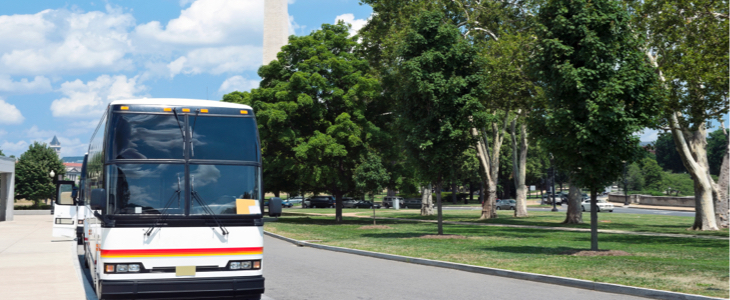Most people, from children to the elderly, have ridden on a bus at some point. Buses are a way of life in metropolitan areas like Washington, D.C. However, there are unique safety risks when it comes to this common mode of transportation. Automobile accidents can be serious. But the danger increases significantly when a much larger vehicle, like a bus, is involved in an accident in Washington, D.C.
Although buses are largely safe thanks to a number of rules and regulations, accidents still occur. And when they do, victims and their loved ones need dedicated legal counsel ready to hold the at-fault parties accountable. That’s why bus accident victims in Washington, D.C. count on the personal injury lawyers of Koonz McKenney Johnson & DePaolis LLP.
What Makes Buses So Dangerous?
Buses are regulated in a number of different ways, with the Federal Motor Carrier Safety Administration (FMCSA) being the primary agency involved with bus regulation. The rules that control these and other large commercial vehicles have made buses safe in recent decades. Nonetheless, there is still a risk that a major accident could claim lives or leave victims seriously hurt.
These are a few reasons that buses are more dangerous than passenger vehicles:
- Size and weight. These are the most obvious differences between a bus and a standard automobile such as a sedan. Not only do these factors make an accident more catastrophic, but they also make buses harder to control. A speeding bus takes more time to slow down, and an out-of-control bus is harder to regain control over.
- More maintenance required. Buses need more regular maintenance because of their size and frequent use. Mechanical problems with critical systems like the brakes can put passengers and others in danger of a major accident.
- Passengers. Because buses carry passengers, there are more potential victims than an accident involving only automobiles. Additionally, passengers themselves can distract drivers and make it harder to safely operate the bus.
Why Do Bus Accidents Happen?
With so much at risk, there’s a lot that can go wrong. After a Washington, D.C. bus accident, it’s important for victims and their families to understand why it occurred. Not only can this prevent future accidents, but it can help the victim determine who was responsible so he or she can be compensated.
Bus accidents can happen for any reason, with some of the most common ones being:
- Maintenance and repair problems. Mechanical failures could happen due to lack of or improper maintenance or repairs. It could also be the fault of a parts manufacturer. For example, if the tires blow out, the tire manufacturer could be at least partly responsible for an accident.
- Inexperienced driver. Driving a bus is not the same as driving a motor vehicle. The driver is required to be properly trained to operate the bus and must have sufficient experience before hitting the road. When this doesn’t happen, lives can be lost.
- Poor conditions. By the same token, the bus driver is trusted to make critical judgments to keep his or her passengers safe. This includes properly operating the bus but also making decisions in light of external conditions like heavy traffic and bad weather.
- Driver negligence. Worse is when a driver is acting irresponsibly due to drug or alcohol impairment, being distracted, not getting enough rest before operating the bus, and more. Although the driver may be negligent, the bus company or governmental entity overseeing it could ultimately be held liable.
Who Is Responsible In A D.C. Bus Accident?
There are often other parties besides the driver who could be held liable after a bus accident. It’s important to investigate whether other parties may be held accountable since drivers themselves usually have inadequate resources to fully compensate victims. The following could be at fault for your bus accident:
- Washington Metropolitan Area Transit Authority (WMATA) or other government agencies. Because buses are sometimes publicly operated, a government agency may be held responsible. There are different rules for holding government entities liable versus private ones, so be sure to consult a knowledgeable attorney.
- Private company. If a private company operated the bus, then either it or the company’s insurer may be accountable for the accident. This may include, for instance, a charter bus or tour bus company.
- Bus or parts manufacturer. The company that manufactured the bus may have failed to properly do so. The same is true for a parts manufacturer. There may be several companies involved with manufacturing the bus, so sorting out liability requires careful investigation.
- Third-party garage or repair shop. If the bus was being repaired or maintained by a third-party garage or repair shop, that party might be liable. That third party may have, in turn, used defective parts from a manufacturer.
- Motorist. In many accidents, another motorist is responsible. If that driver turned out to be negligent, his or her insurance company could be forced to pay a victim’s damages.
Depending on the circumstances in your case, these and other parties may be responsible for your bus accident. Sometimes, more than one party can share liability. Ensuring that all potentially responsible parties are identified, and holding them accountable, is why you hire a skilled lawyer. Our firm is ready to help.
Contact A D.C. Bus Accident Attorney
Being involved in a bus accident can be a frightening experience. You’re probably worried about the medical bills piling up and wondering how you’re going to support your family while you recover. Let the team at Koonz McKenney Johnson & DePaolis LLP put those fears to rest. Call today to get started on your case.
Koonz McKenney Johnson & Depaolis serve residents of Washington DC including those living in Capitol Hill, Columbia Heights, Downtown District of Columbia, Foggy Bottom, Georgetown, and Mount Vernon.

